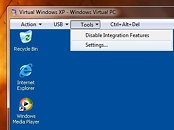Monday, April 27th 2009

Windows 7 to Pack Virtual Windows XP
Across generations of its Windows operating systems based on the NT architecture, Microsoft has been courteous enough to pack application compatibility layers that let users run applications in compatibility modes for older versions of the OS. The company seems to be taking this to the next level with Windows 7. The release candidate of the OS slated for April 30, will pack an "XP mode" virtualization feature. The feature quite literally runs a Windows XP environment inside a sandbox complete with support for applications such as Internet Explorer 6, etc.
The environment will work on a virtual machine created by Windows 7. Native Windows XP applications you install in the environment, along with your documents and settings will further be accessible from the host OS. Client variants of Windows 7 may feature a Hyper-V hypervisor that handles applications such as these. The feature makes Windows 7 especially something to look forward to, for those complaining lack of Windows XP features. In short, it's the OS some probably clung onto, and refused to move to Vista, running as an application.
Sources:
CrunchGear, betanews
The environment will work on a virtual machine created by Windows 7. Native Windows XP applications you install in the environment, along with your documents and settings will further be accessible from the host OS. Client variants of Windows 7 may feature a Hyper-V hypervisor that handles applications such as these. The feature makes Windows 7 especially something to look forward to, for those complaining lack of Windows XP features. In short, it's the OS some probably clung onto, and refused to move to Vista, running as an application.

75 Comments on Windows 7 to Pack Virtual Windows XP
I thought the whole point of Windows 7 was to be a more stable and faster Windows Vista so that the entire "Vista sux, stik with XP" crowd can finally be put to rest.
That being said, Windows 7 beta has serious compatibility issues even with Windows Vista-compatible applications (Skype doesn't even work).
I've not heard of any business applications that won't work in Vista. In any case, that would be only a small amount of customers. We're talking about home editions anyway.
But, I'm talking about the private sector, that make up most of the sales and the consumer base, because the argument is that Vista is slow and unstable, not incompatible.
Paul Thurrott provides an in depth description of the feature:
XP Mode consists of the Virtual PC-based virtual environment and a fully licensed copy of Windows XP with Service Pack 3 (SP3). It will be made available, for free, to users of Windows 7 Professional, Enterprise, and Ultimate editions via a download from the Microsoft web site. (That is, it will not be included in the box with Windows 7, but is considered an out-of-band update, like Windows Live Essentials.) XPM works much like today’s Virtual PC products, but with one important exception: As with the enterprise-based MED-V (Microsoft Enterprise Desktop Virtualization) product, XPM does not require you to run the virtual environment as a separate Windows desktop. Instead, as you install applications inside the virtual XP environment, they are published to the host (Windows 7) OS as well. (With shortcuts placed in the Start Menu.) That way, users can run Windows XP-based applications (like IE 6) alongside Windows 7 applications under a single desktop.
Does this allow 32bit XP to run in Win7-64? Great!
Does this mean MS will supprt XP a little bit longer with security updates and patches? Great!
No compatibility issues I just installed and used it as normal. The only program that hasn't worked for me was an anti-cheat program for an MMO :rolleyes: (they wont fix it till 7 actually comes out).
Windows 7 having this as an extra doesn't persuade anyone to switch from XP to win 7, actually it's for the Vista crowd, think about it. ;)
I do like Win 7, however disagree with the pricing and class system. Why should there be a business, professional, or ultimate version? That just pushes up development time and costs, and can be reflected in the price and the amount of patching.
I don't have a solution for making a stable and cheap OS, but teasing customers the way Microsoft do is dangerous with linux/unix flavours catching up and Mac OS becoming more popular (it feels like everywhere I look these crazy Mac people are telling me about how great Apple's products are!).
I also wish people would stop complaining about Vista's slowness. All the bad press convinced people that it's much worse than it actually is. As TAU said, it just rocks on a modern machine. It's a new operating system, so it's bound to be a bit ahead of current hardware. Just remember that the same was said about Win 2000 when it came out, then about XP... Of course XP flies on today's hardware, seven years after the OS was launched, DUH !
I run 64 Ultimate on a C2D E 4500 with 4 GB of RAM and Vista is very fast and stable and looks great. Will probably switch to Win 7 after a service pack or two :)
BTW, if the hardware requirements for Win7 are similiar to Vista's, I think it's going to do a lot better.
7's hardware requirements are basically the same on paper - in reality it will perform better due to its lower ram overhead. I'm confident the reason this has taken place is that MS wants to see 7 on next generation atom devices, like the eeePC and MSI wind. (this is also why i think they didnt make just an x64 version, those CPU's arent 64 bit)
anyway interesting feature this, i dont see my self using it tho but a full os built into this os is cool
But watch them stuff it up some other way.